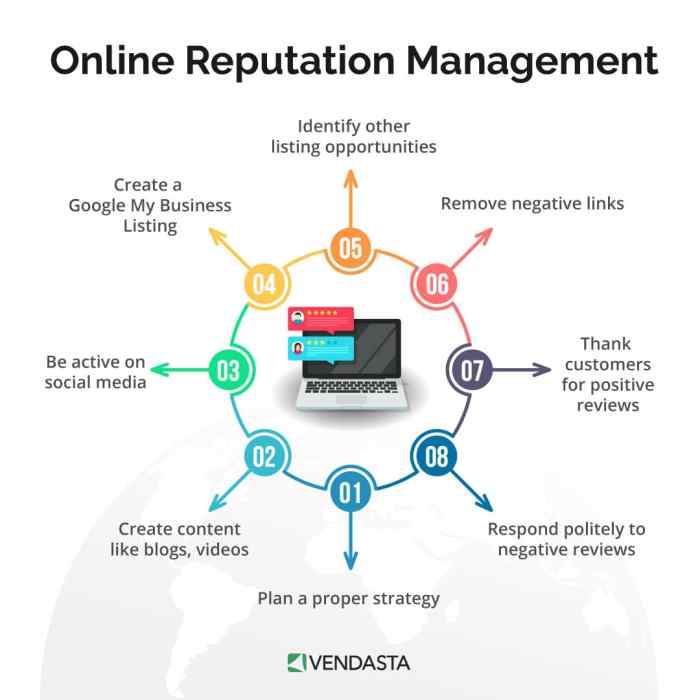Online Reputation Management sets the stage for controlling how individuals and businesses are perceived online, diving into the strategies, tools, and success stories that shape this crucial aspect of the digital world.
Introduction to Online Reputation Management

Online Reputation Management (ORM) refers to the practice of shaping and controlling the public perception of individuals or businesses on the internet. It involves monitoring, addressing, and mitigating negative content while promoting positive content to build a strong online reputation.
Maintaining a positive online reputation is crucial in today’s digital age. With the widespread use of the internet and social media platforms, people often turn to online reviews and ratings before making decisions. A negative online reputation can deter potential customers, clients, or employers, leading to missed opportunities and damage to one’s personal or professional image.
Impact on Businesses and Individuals
- Businesses: A strong online reputation can attract new customers, increase sales, and build trust and credibility. On the other hand, a negative online reputation can result in loss of customers, revenue, and even legal issues. ORM helps businesses maintain a positive image and respond effectively to any online crises.
- Individuals: For individuals, a positive online reputation is essential for career advancement, networking opportunities, and personal relationships. Employers often conduct online searches on potential candidates, making it crucial to present oneself in a positive light. ORM can help individuals manage their online presence and showcase their strengths.
Strategies for Effective Online Reputation Management

In today’s digital age, maintaining a positive online reputation is crucial for businesses to attract customers and build trust. Here are some common strategies used in Online Reputation Management (ORM):
Monitoring Online Reputation
- Utilizing online monitoring tools: Companies use tools like Google Alerts, Social Mention, and Brand24 to track mentions of their brand across the web.
- Monitoring review sites: Keeping an eye on review sites like Yelp, TripAdvisor, and Google My Business to address any negative feedback promptly.
- Tracking social media: Regularly monitoring social media platforms such as Facebook, Twitter, and Instagram to engage with customers and manage any issues that arise.
Managing Customer Feedback
- Responding to reviews: Acknowledging both positive and negative reviews and addressing customer concerns in a timely and professional manner.
- Encouraging positive feedback: Actively seeking feedback from satisfied customers to boost positive online sentiment.
- Implementing feedback loops: Using customer feedback to improve products, services, and overall customer experience.
Engaging with Influencers
- Collaborating with influencers: Partnering with influencers in the industry to promote positive brand awareness and reputation.
- Managing influencer relationships: Ensuring influencers align with the brand values and maintaining transparent communication throughout partnerships.
Creating Quality Content
- Producing valuable content: Publishing high-quality and relevant content that showcases the brand’s expertise and values.
- Optimizing : Implementing strategies to improve the visibility of positive content and push down any negative search results.
Role of Social Media in ORM Strategies
Social media plays a critical role in Online Reputation Management by providing a platform for direct interaction with customers and controlling the narrative around a brand. Companies leverage social media for:
- Responding to customer inquiries and feedback promptly.
- Sharing positive stories and testimonials to build credibility.
- Monitoring conversations and addressing any issues or negative sentiment.
- Engaging with followers and fostering a community around the brand.
Tools and Resources for Online Reputation Management
In today’s digital age, it’s crucial for businesses to monitor and manage their online reputation effectively. This requires the use of various tools and resources designed specifically for online reputation management. Let’s explore some popular options and their benefits.
Popular Tools for Monitoring Online Reputation
- Social Mention: This tool allows businesses to monitor mentions of their brand across social media platforms in real-time.
- Google Alerts: Google Alerts notifies businesses whenever their brand is mentioned online, helping them stay on top of their online reputation.
- Reputology: This tool is specifically designed for monitoring and managing online reviews, making it easier for businesses to respond to customer feedback promptly.
Benefits of Using Online Reputation Management Software
- Efficiency: Online reputation management software automates the monitoring process, saving businesses time and effort.
- Insight: These tools provide valuable insights into customer sentiment, allowing businesses to make informed decisions to improve their reputation.
- Proactivity: By using online reputation management software, businesses can address any negative feedback or mentions promptly, preventing potential reputation damage.
Utilizing Google Alerts for ORM
Google Alerts is a powerful and free tool that businesses can use to monitor their online reputation effectively. By setting up alerts for their brand name, products, or industry s, businesses can stay informed about what’s being said about them online. This allows them to respond quickly to any negative feedback, engage with customers, and maintain a positive online reputation.
Case Studies
Online Reputation Management is crucial for businesses to maintain a positive image in the eyes of customers. Let’s look at some examples of companies that have successfully managed their online reputation and the strategies they used to overcome negative feedback.
Company A: XYZ Inc.
XYZ Inc. faced a major crisis when a customer posted negative reviews about their product quality. The company immediately responded to the complaints, offering refunds and replacement products to dissatisfied customers. They also launched a social media campaign highlighting their commitment to quality and customer satisfaction.
Company B: ABC Co.
ABC Co. experienced a backlash on social media due to a controversial ad campaign. The company issued a public apology and took down the offensive content. They then engaged with customers directly, addressing their concerns and implementing new diversity and inclusion initiatives within the company.
Long-Term Impact
By effectively managing their online reputation, both XYZ Inc. and ABC Co. were able to regain customer trust and loyalty. The positive actions taken by these companies not only resolved immediate issues but also helped in building a strong, positive brand image in the long run.
